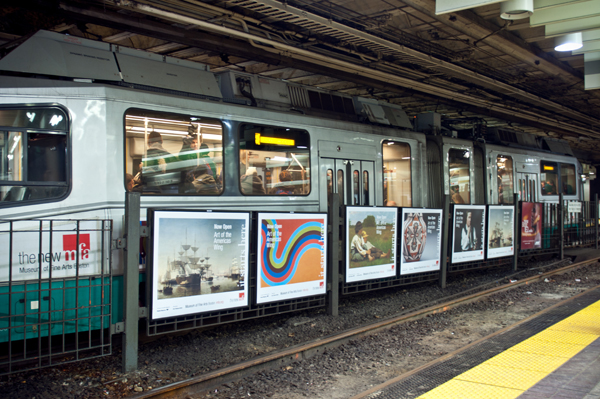Deval Patrick MIA on MBTA
 The Green Line. (Photo by Chelsea Kyle.)
The Green Line. (Photo by Chelsea Kyle.)
In New York City, Mayor Michael Bloomberg has the charming — if strangely patronizing — habit of riding the subway to work. But here in Massachusetts, these days it’s hard to tell if Governor Deval Patrick even knows the T exists. As the debate over service cuts and fare hikes on the MBTA has heated up, the governor has shrunk away, leaving his transportation secretary, Richard Davey, and the MBTA General Manager, Jon Davis, to bear the brunt of the public’s anger at hearings on the issue. The MBTA may be in crisis, but Patrick didn’t mention the system once in his State of the Commonwealth Address in January and has been mum on the subject since.
“Both Jon Davis and I are personally engaged on the governor’s behalf. I have been giving the governor regular reports on the hearings, in fact we spoke about it earlier today,” Davey told me at the end of last week. “That’s why he hired me. I’m his transportation secretary. Just because he has not as been out in front of this as either I or Jon Davis, he remains concerned and in constant communication with us about how this is going.”
I get that service cuts and fare increases are not exactly the type of thing the governor wants to wrap himself up in. Especially after he was burned three years ago proposing an increase in the gas tax. But the MBTA’s problems go much deeper than these fare and service issues. The authority has a projected $161 million budget deficit for this fiscal year and is about $8.6 billion in debt. The MBTA is so weighed down by its borrowing that it basically pays as much in debt service per year as it makes in fares. The money crunch has had a real impact on service too, as, according to Davey, the authority is spending $200-$250 million less per year than it should on maintenance projects. As a result, just to fix everything that currently needs fixing on the T would cost about $3 billion. That’s $3 billion just to get everything back to working order! To top it all off, there are entire fleets of vehicles out on the rails that should have been retired years ago.
But the service cuts and fare hikes proposed by Davey and Davis only address the MBTA’s short-term problems. All they do is close this year’s $161 million budget deficit. They do nothing about the backlogged maintenance problems and nothing about the mountain of debt. They do nothing to make the T safer or more on-time. They’re putting a Band-Aid on a bullet wound.
This all goes back to a series of miscalculations that were made in 2000, when the legislature passed the now notorious “Forward Funding” plan that essentially bankrolled the MBTA by giving it 20 percent of the state sales tax. As sales tax receipts have flagged over the years (hello, internet commerce), the MBTA has been left shortchanged, without enough money to properly operate the system. Forward funding also failed to anticipate that several costs, like those for gas and healthcare, would increase over time. That’s burdened the T with annual deficits, which it filled for years by borrowing. That led to higher debt service payments which led to bigger annual budget deficits, which, of course, led back to more borrowing. And round and round it went.
Finally, this year, to Davey and Davis’s credit, they decided that the authority could borrow no more to plug the hole in its budget. Instead they decided to plug the hole by a combination of fare increases and service cuts.
With its unreliable service and past excesses, it will be no easy feat to convince people that the MBTA’s problems aren’t waste, corruption, and bureaucratic bloat, but deep structural flaws in its very organization. Especially considering all the outrage we’ve seen at the hearings on the fare hikes and service cuts.
Which brings us back to Patrick. He has the biggest bully pulpit in the state and the ability to lead the way toward the comprehensive reform the MBTA needs.
“The public is desperate for leadership on this,” says Brian Kane, an analyst at the MBTA Advisory Board (a sort of watchdog group). “Where the heck is the leadership? I’m not saying it’s the governor specifically, but he made transportation reform one of his signature issues … Where is he?”
Davey contends that Patrick has led: from his landmark transportation reform bill in 2009 to the gas tax proposal to the decision for the MBTA not to borrow any more money this year. Which, as Kane points out, makes it all the more curious why he’s disappeared on the issue.
The scary thing is that if Patrick, a popular second-term governor not seeking reelection, is not interested in the heavy lifting it will take to reform the T, who will be?
Davey advises patience. “Once we put a one year solve into place in April, there’ll be plenty of opportunity for a whole host of leaders to more personally engage as well,” he says. “I think that before the governor leaves office there will be a significant effort to reform the way transportation is funded.”
Let’s hope so.

